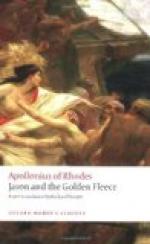And as they went Hera with friendly thought spread a thick mist through the city, that they might fare to the palace of Aeetes unseen by the countless hosts of the Colchians. But soon when from the plain they came to the city and Aeetes’ palace, then again Hera dispersed the mist. And they stood at the entrance, marvelling at the king’s courts and the wide gates and columns which rose in ordered lines round the walls; and high up on the palace a coping of stone rested on brazen triglyphs. And silently they crossed the threshold. And close by garden vines covered with green foliage were in full bloom, lifted high in air. And beneath them ran four fountains, ever-flowing, which Hephaestus had delved out. One was gushing with milk, one with wine, while the third flowed with fragrant oil; and the fourth ran with water, which grew warm at the setting of the Pleiads, and in turn at their rising bubbled forth from the hollow rock, cold as crystal. Such then were the wondrous works that the craftsman-god Hephaestus had fashioned in the palace of Cytaean Aeetes. And he wrought for him bulls with feet of bronze, and their mouths were of bronze, and from them they breathed out a terrible flame of fire; moreover he forged a plough of unbending adamant, all in one piece, in payment of thanks to Helios, who had taken the god up in his chariot when faint from the Phlegraean fight.[1] And here an inner-court was built, and round it were many well-fitted doors and chambers here and there, and all along on each side was a richly-wrought gallery. And on both sides loftier buildings stood obliquely. In one, which was the loftiest, lordly Aeetes dwelt with his queen; and in another dwelt Apsyrtus, son of Aeetes, whom a Caucasian nymph, Asterodeia, bare before he made Eidyia his wedded wife, the youngest daughter of Tethys and Oceanus. And the sons of the Colchians called him by the new name of Phaethon,[2] because he outshone all the youths. The other buildings the handmaidens had, and the two daughters of Aeetes, Chalciope and Medea. Medea then [they found] going from chamber to chamber in search of her sister, for Hera detained her within that day; but beforetime she was not wont to haunt the palace, but all day long was busied in Hecate’s temple, since she herself was the priestess of the goddess. And when she saw them she cried aloud, and quickly Chalciope caught the sound; and her maids, throwing down at their feet their yarn and their thread, rushed forth all in a throng. And she, beholding her sons among them, raised her hands aloft through joy; and so they likewise greeted their mother, and when they saw her embraced her in their gladness; and she with many sobs spoke thus:
[Footnote 1: i.e. the fight between the gods and the giants.]
[Footnote 2: i.e. the Shining One.]
“After all then, ye were not destined to leave me in your heedlessness and to wander far; but fate has turned you back. Poor wretch that I am! What a yearning for Hellas from some woeful madness seized you at the behest of your father Phrixus. Bitter sorrows for my heart did he ordain when dying. And why should ye go to the city of Orchomenus, whoever this Orchomenus is, for the sake of Athamas’ wealth, leaving your mother alone to bear her grief?”




